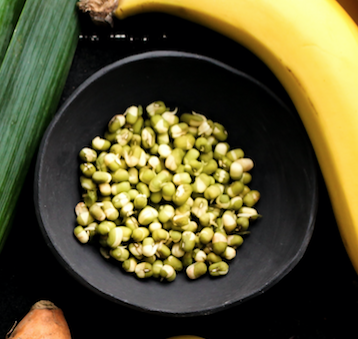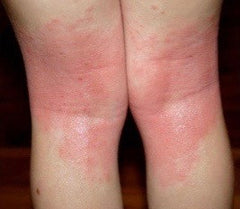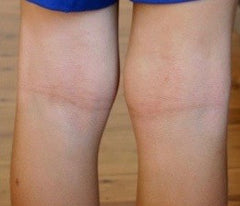
FAQ: “I’ve had eczema for several years and I have been using topical steroids and anti-histamines but my eczema now smells. Why does my eczema smell bad and what can I do about it?”
I've had many requests to write this blog post. We receive hundreds of emails and calls each week since appearing on 7 News Australia. It seems everyone is keen to stop using topical drugs and start treating their eczema from the inside out. So I will try to answer as many questions I can each week via my blog, so sign up below.
Watch the 7 News video (or read on)...
Here are the top 5 reasons eczema can smell bad, plus the top 5 tips to prevent the smell:
The smell of eczema... what?
Eczema is often itchy, flakey and painful. If that is not bad enough, eczema can also have a distinct smell which is unique to people with eczema.
One eczema sufferer on an online blog likened it to the faint smell of "rotting meat or cheese”. Another blogger likened it to the smell of sweaty feet. Don't worry, there is plenty you can do to prevent the smell.
- Not everyone with eczema has smelly skin, there are factors involved (which are covered shortly).
The top 5 reasons eczema can smell bad
You may be surprised to find that bathing habits are not the problem. You can shower daily and still suffer. That's because the smell is often caused by eczema treatments, hence the unique smell.
The main culprits are topical steroids, topical immunosuppressants and antihistamine medications. Some types of diets can also worsen the smell (more on this later).
1. Why topical steroids make eczema smell
Frequent use of topical steroids (and any steroid medications) can make the skin smell bad because it increases acid in the body. An overly acidic body is a smelly one. Topical steroids also cause hormonal changes and delayed wound healing which can worsen the smell.
If you are not sure if you are using topical steroids, check the list here.
2. Why immunosuppressants lead to smelly eczema
Topical immunosuppressants are another eczema treatment that can cause the skin to smell. Doctors consider these drugs a “last resort” as they suppress the activity of your immune system, and doctors are often reluctant to prescribe them due to potential side-effects.
The side-effects of using immunosupressants for eczema can include increased colds and flu symptoms, depression, damage to the kidneys, increased risk of skin cancer, high blood pressure, swollen gums, hair loss and smelly eczema. This sounds like the opposite of good health!
So why do people still use topical immunosuppressants?
Probably because they are not given healthy alternatives or hope. Most are told "there is no known cure for eczema". But that only means "there is no quick-fix patented drug to magically fix eczema". But there are natural options and you need to know about these. Remember knowledge is power.
If you are not sure if you are taking a topical immunosuppressant, check the list here.
3. Why antihistamines create body odour
Antihistamines are sold in the form of syrups and tablets and they are taken orally. They may seem like harmless "allergy and hay fever medications" but they are just as bad as the topical steroids for two reasons:
- Anti-histamine drugs reduce phase 1 liver detoxification of chemicals so your liver under functions and has a bit of a holiday making you temporarily feel better. BUT this puts a heavier burden on your skin. You see, your skin is also a detox organ when you sweat. The more your skin is burdened with toxins (that should have been deactivated by your liver), the smellier your sweat will be.
- Anti-histamines are also acid forming in the body – and an overly acidic body smells bad.
Oral antibiotics
Sometimes it is necessary to take antibiotics if your eczema is infected. I repeat – it is important to treat skin infections with antibiotics as eczema is an open wound and infections will prevent your eczema from clearing up.
However, taking antibiotics too often is a problem as it increases acid in the body and kills gut microflora.
"I no longer have eczema and I still smell bad!"
Your eczema does not need to be an open wound or oozing for the smell to occur. Even when the eczema is successfully “controlled” with the use of topical steroids or immunosuppressants – i.e. no visible rash and no infection – the skin can smell. It is easy to treat but you have to stop relying on drug treatments that cause the smell.
4. Your diet can also make your eczema smell worse
The eczema smell can occur even when you are not using medical drugs, for the following reasons:
Ketosis: High protein/low carb diets can create excess acid in the body, and when ketosis occurs it causes the body to smell. This smell is a bit different to the typical eczema smell – it can smell a bit like nail polish or bad sweat. If you have ever dated someone on the original Atkins diet (before they updated it and added quality carbs) you know what I mean!
Junk food: eating a poor diet rich in sugar and refined/processed white flour products can worsen eczema and the smell. Why? Because sugar feeds yeast and can lead to infestations which can worsen the smell of eczema.
5. Topical steroid withdrawal can trigger the smell
The smell can worsen when you go through topical steroid withdrawal. This is caused by the skin going a detox phase and it can be caused by hormonal changes and oozing skin.
Multiple nutritional deficiencies also occur as the body uses extra nutrients during this painful period of healing. This can be successfully combatted by proper nutrition and the Body Fresh drink recipe, below.
Skin infections:
Skin infections can smell bad so check with your doctor if you suspect your skin is infected. If your eczema smell lingers after treatment (which is typical) then it is unlikely the skin infection is the cause - it's more likely to be the topical creams you are using to suppress your skin inflammation.
- Medical/topical drugs are the main culprits that trigger the eczema smell.
FAQ: "Do I need to shower more?"
Not usually. Most eczema sufferers shower daily or spend hours in the bath (if going through TSW) and they find it does not prevent the smell for long.
- Showering is important and advised, but it will not prevent the smell if you do not address the underlying cause/s of your eczema.
Top 5 ways to prevent the smell of eczema
1. Avoid eczema drugs
The first step is to stop using the topical drugs for eczema. If you are using topical steroids you must do this gradually over a period of about six weeks to reduce the risk of topical steroid withdrawal (see my TSW blog here for how to safely go off topical steroids).
It’s time to stop using drugs designed to suppress the eczema – suppression is not healing. Suppression can lead to other health problems such as asthma and rebound eczema which is worse than the original problem.
2. Use skin-repairing nutrients
Eczema is broken skin so consuming skin-repairing nutrients is essential to heal your eczema.
I have seen hundreds of eczema sufferers with obvious signs of nutritional deficiencies and this contributes to their painful symptoms. When my daughter had eczema, we began with diet changes which are detailed in The Eczema Diet.
Then I had a skin supplement designed for her using the information I learnt while studying nutritional biochemistry. Her eczema miraculously cleared up. That was fourteen years ago. As I'm a sceptic, I didn't publish this information until I had used it to help hundreds of eczema patients at my clinic. We did small clinical trials and tested several versions of the formulas. Here is some of the information we found:
- Zinc helps but the wrong dose will make eczema worse
- B vitamins are essential to heal eczema but high doses are acidic and will make you itch more (low daily does is the key!). Most multi vitamins contain too many B vitamins so that is why you itch more
- Vitamin A (all retinol forms) should be avoided as they will make your skin peel and shed like crazy
- You need some liver detox nutrients but you need to avoid the ones that make you itch
- More than 52% of eczema sufferers will adversely react to liver detox herbs as their skin will ooze more as a result
- Calcium carbonate is the best form of calcium for eczema as it is highly alkalising AND salicylate-free (calcium citrate can make eczema worse as it is mostly citric acid - but it is favoured by naturopaths)
- Vitamin E helps to reduce the Th2 part of the immune system (this is beneficial for eczema)
All of the research has helped to formulate Skin Friend, so if you are already taking it you won't need to buy these nutrients separately.
Zinc for eczema
I recommend 8-10mg of zinc gluconate for teens and adults, and 4-5mg for children. The correct dose of zinc is already in Skin Friend, if you are taking Skin Friend you won't need to take additional supplements. Always take zinc with food, and not with calcium or iron supplements as they compete for absorption.
Many practitioners recommend much higher doses of zinc but they don’t understand zinc’s effects if used at high doses. Zinc is stored in your liver so too much will stress the liver and can cause vomiting and nausea to name a few. High doses of zinc cause copper deficiency which will prevent your eczema from healing. I repeat - zinc is great but don't overdo it.
Do your research on zinc causing copper deficiency as skin collagen formation cannot occur without copper (which results in skin defects and sagging skin as seen in people with topical steroid withdrawal). The key is to take nutrients in the right balance.
Here is a recipe to neutralise the eczema smell permanently. You can also use the recipes from the Eczema Diet such as Alkaline Bomb Salad.
3. Body Fresh Drink
Try this healthy alkalising drink to neutralize the smell of eczema from the inside out and. This recipe is highly alkaline and great for your eczema.
The unique benefit of this drink is it is a low chemical drink – meaning it is low in salicylates. Salicylates are a type of natural pesticide made by some plants to deter pests. Salicylates are found in most herbs, and are found in very high levels in wheatgrass, other green powders, tomato, pineapple, oranges and broccoli – all foods which can greatly worsen eczema if you have chemical sensitivities.
If your eczema is bad or if you are going through Topical Steroid Withdrawal, you will need to give the drink time to work. For example, drink it daily for a few weeks and you can also use the juice recipes in the Eczema Diet book for variety. It’s the fastest way to be rid of the smell forever.
Body Fresh Drink recipe
This recipe contains alkalising banana, and highly alkalising mung bean sprouts and parsley to freshen your body and help restore acid-alkaline balance. Rice malt syrup is also alkalising and is an optional ingredient.

Photo: mung bean sprouts
These ingredients have been carefully chosen for their low-chemical properties and all ingredients are low/no salicylates making them eczema-friendly and alkalising. You can use quality rice milk instead of water if you prefer.
Ingredients
- 1 small banana, about 1 cup when chopped (pre-freeze, read ‘method’)
- 1 cup chilled filtered water
- 1-2 flat scoops Skin Friend AM (zinc, vitamin C, B vitamins etc)
- 1 heaped tablespoon mung bean sprouts, washed thoroughly (see photo, above, for correct variety)
- a few sprigs of fresh parsley (heaped tablespoon), washed
Method
Peel and cut the banana into bite-sized pieces then place into a sealed container or plastic zip lock bag and freeze overnight (can do several bananas, ready for a 3-day supply).
The next morning make the drink for a 1 day supply: place all ingredients into a high powered blender and blend on high until smooth. Drink immediately (it does not store well).
Optional
If you want to add sweetener only use “salicylate-free” sweeteners: rice malt syrup or real maple syrup. All other sweeteners are rich in salicylates and could make you very itchy so don’t use substitutes.



Photos: my daughter when she had eczema (before and after)
OUR PRODUCTS
References
Niwa, Y., Terashima, T. and Sumi, H., 2003. Topical application of the immunosuppressant tacrolimus accelerates carcinogenesis in mouse skin. British Journal of Dermatology, 149(5), pp.960-967.
Mihatsch, M.J., Kyo, M., Morozumi, K., Yamaguchi, Y., Nickeleit, V. and Ryffel, B., 1998. The side-effects of ciclosporine-A and tacrolimus. Clinical nephrology, 49(6), pp.356-363.
Elidel Side-effects https://www.drugs.com/elidel.html
Henkin, R.I., 1974. Zinc in wound healing.
Photos: Image of woman from Shutterstock; image of eczema is of my daughter when she had eczema. The image of my daughter may not be used for any other purpose other than this article.









 Nothing will be posted on your behalf.
Nothing will be posted on your behalf.


Hi Patty, as long as you take Calcium PM, you will be covered for your calcium intake. You can find Calcium Matrix here
https://www.jolieeskin.com/products/calcium-matrix-pm
Regards
Deb
HI Gen,
We do think the diet and treatment has positive effects for psoriasis sufferers.
This post may help https://www.jolieeskin.com/pages/psoriasis-treatments-triggers-and-facts
Deb (support at Joliee Skin)
In your book it states in the section on calcium, that calcium citrate is the best form for eczema…..now you say it is calcium carbonate…I am confused….can you clarify??
Thanks
Hi Karen, I have psoriasis. Would your advice and treatment for eczema be the same for psoriasis?? Thanks, Gen